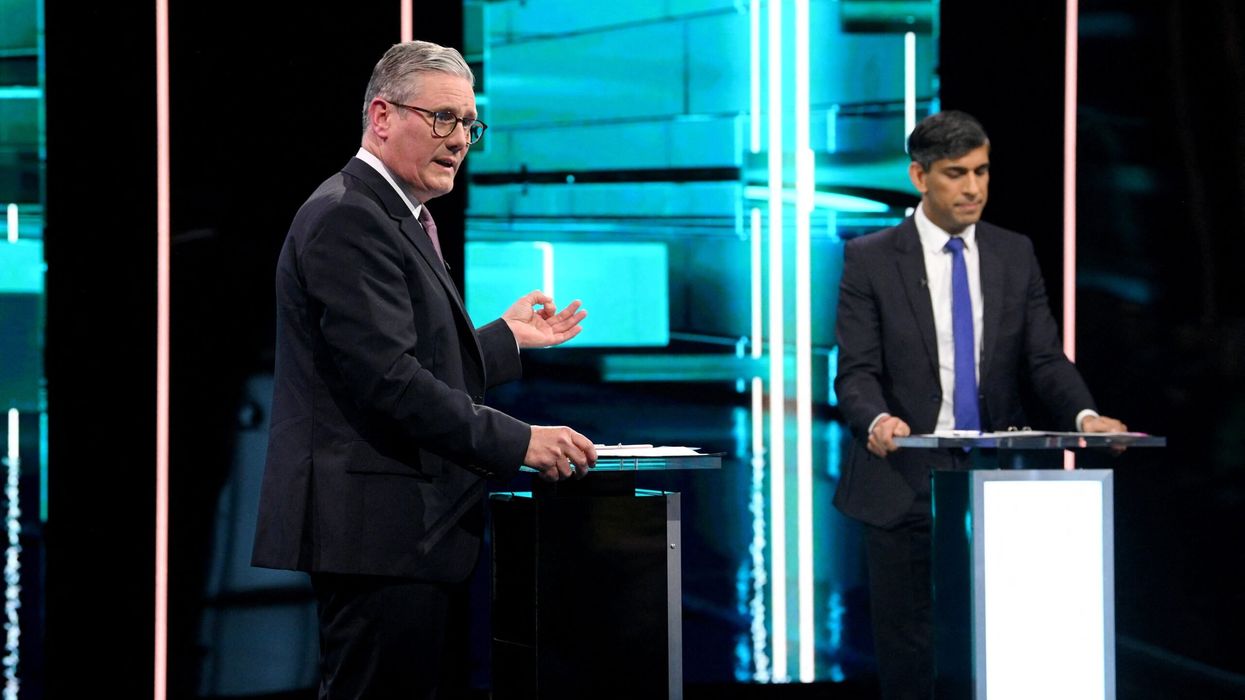PRIME Minister Rishi Sunak and Labour challenger Keir Starmer went head-to-head on Tuesday (4) over how to boost Britain's economy, with the PM accusing the opposition party of wanting to increase taxes if it wins power at a July 4 election.
Sunak said he had "a clear plan for a more secure future" while Starmer said he wanted the country's backing on July 4 to "change our country".
Both Sunak, a Conservative, and Starmer stuck to their campaign lines in their first debate just weeks before a general election opinion polls suggest Labour is set to win, with Sunak saying only he had a plan to spur Britain's paltry economic growth and Starmer portraying the Conservatives as presiding over 14 years of economic chaos.
In a heated debate - a recent feature in Britain and one which sees more voters tune into politics - the two leaders battled over how to tackle the cost-of-living crisis, growing waiting lists in the public health service and reducing immigration.
Both men were told repeatedly not to speak over each other and asked to lower their voices as they clashed over issues, but neither outlined any new plans.
Most of the questions illustrated what many voters are contending with: a cost-of-living crisis when some struggle to pay their household bills, long waits for the health service and lower standards in the education system.
"Keir Starmer is asking you to hand him a blank cheque when he hasn't said what he'll buy with it or how much it's going to cost you," Sunak said in his closing comments. "In uncertain times we simply cannot afford an uncertain prime minister."
Starmer responded saying he would never offer "the gimmicks or unfunded promises that Rishi Sunak does".
"Imagine how you would feel waking up on July 5 to five more years of the Conservatives, five more years of decline and division, the arsonists handed back the matches," he said.
"Now imagine turning the page with a Labour government that rolls up its sleeves and gets on with the job... The choice at this election is clear: more chaos with the Conservatives or the chance to rebuild Britain with a changed Labour Party."
Sunak on the attack
Sunak repeated the Conservatives' attack line that Labour had no plan for the country beyond putting "everyone's taxes up by £2,000."
"Mark my words, Labour will raise your taxes. (It) is in their DNA. Your work, your car, your pension, you name it, Labour will tax it," Sunak said.
Starmer did not deny the charge immediately, but he later called the £2,000 figure "nonsense". Labour has repeatedly said it will not raise income tax or National Insurance social security contributions if it wins power.
"My dad worked in a factory, he was a toolmaker, my mum was a nurse. We didn't have a lot of money when I was growing up," the Labour leader told an audience member who said she was struggling to pay her bills.
"So, I do know the anguish of worrying when the postman comes with a bill, what bill is it, am I going to be able to I pay it? I don’t think the prime minister quite understands."
Starmer attacked the Conservative Party for presiding over 14 years of chaos and Sunak's plans to introduce mandatory national service.
The prime minister drew groans when he blamed growing waiting lists at the National Health Service on strikes, and was greeted by laughter when he said the numbers were going down "because they were higher" before.
Immigration
But he seemed to make up some ground with the audience when discussing how he planned to tackle immigration, portraying his plan to send illegal asylum seekers to Rwanda as a deterrent the Labour Party was lacking and saying he would put the country's security above any foreign court.
Starmer said he also had a plan to tackle immigration, which has become a prominent concern among voters, and that he would consider processing asylum claims in a third country if doing so didn't breach international law.
Sunak, whose campaign has yet to reduce Labour's lead of around 20 percentage points in opinion polls, was on the attack, repeating the line that only his party had a plan, whereas voters did not know what Starmer intended to do if he won power.
Farage factor
The two-way leaders’ debate comes a day after populist Nigel Farage said he was running in the election, a major blow to Sunak with the Brexit campaigner expected to peel off the votes of many right-wing voters.
At an earlier campaign launch, Farage said he would be a thorn in the Conservatives' - and Labour's - side.
"I will be unafraid, despite what everybody says, despite what names they call me, they are so stupid it only encourages me really," he told dozens of supporters in southeastern England. "Send me to parliament to be a bloody nuisance."
Read Also; Modi set for tougher ride; key ally pledges support
Not everyone appeared to back his tub-thumping man-of-the-people rhetoric. As he emerged from a pub, he was doused in what appeared to be a banana milkshake.
A 25-year-old woman was later arrested on suspicion of assault.
Audience poll
Sunak won the first televised election debate by a wafer-thin margin, a YouGov snap poll for Sky News showed on Tuesday.
The poll showed 51 per cent thought Sunak performed better, compared to 49 per cent for his Labour Party rival Starmer. (Agencies)




